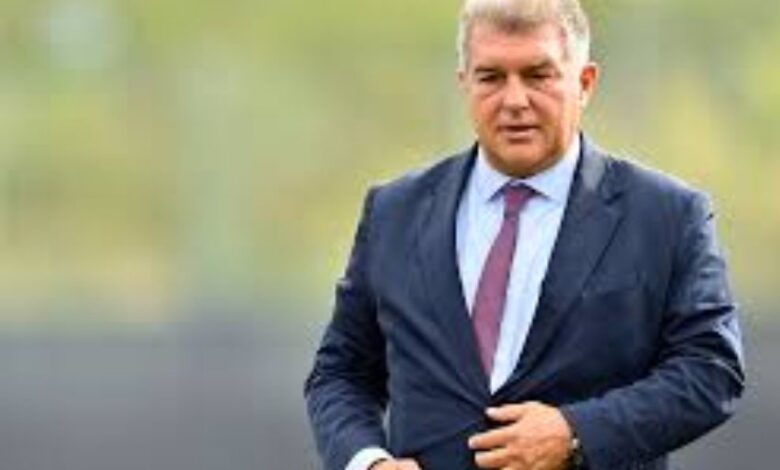Joan Laporta: The Visionary Leader of FC Barcelona

Joan Laporta is a name synonymous with FC Barcelona’s rich history and its modern resurgence. Serving as the club’s president during two distinct periods, Laporta has navigated some of the most challenging and rewarding times in the club’s history. His leadership has been marked by both bold moves and controversial decisions, all aimed at restoring Barcelona’s position as one of the premier football clubs in the world. From financial management to sporting success, Joan Laporta has been a central figure in shaping the direction of FC Barcelona, particularly during times of crisis.
The Early Days: Joan Laporta’s First Presidency (2003-2010)
Joan Laporta’s first stint as president of FC Barcelona began in 2003, at a time when the club was struggling both on and off the pitch. Under his leadership, Barcelona experienced one of the most successful periods in its history. Laporta’s first tenure saw the club win numerous domestic and international titles, including multiple La Liga championships and two UEFA Champions League titles. His focus on signing world-class players and supporting youth development at La Masia, Barcelona’s famed academy, helped establish a foundation for long-term success.
During this period, Laporta hired Frank Rijkaard as the club’s manager, and later, Pep Guardiola, who would go on to become one of the most successful coaches in football history. Under Guardiola’s leadership, Barcelona played an iconic brand of football, which is still revered today. Laporta’s ability to spot managerial talent was one of his key strengths in his first presidency, and it set the stage for the club’s dominance in European football.
Financial Turmoil and a Return to Presidency (2021-Present)
When Joan Laporta returned as president in 2021, FC Barcelona was in a dire financial situation. The club had accumulated debts exceeding €1.35 billion, and mismanagement under previous administrations had left Barcelona on the brink of financial ruin. Upon his return, Laporta took bold steps to stabilize the club, including renegotiating player contracts, reducing the wage bill, and introducing “financial levers”—strategies that allowed the club to raise funds by selling future revenues in exchange for immediate cash flow.
One of the most significant challenges Laporta faced upon his return was managing the departure of Lionel Messi, arguably the greatest player in the club’s history. Due to Barcelona’s financial constraints and La Liga’s salary cap rules, the club was unable to renew Messi’s contract, leading to his move to Paris Saint-Germain. This was a devastating blow to fans, but Laporta remained steadfast in his mission to rebuild the club, focusing on long-term stability rather than short-term solutions.
Controversial Decisions: The Use of Financial Levers
A key element of Laporta’s strategy to revive Barcelona’s fortunes was the use of financial levers. These mechanisms involved selling portions of the club’s future revenue, such as broadcasting rights, in exchange for immediate capital. This approach was highly controversial, with critics arguing that it mortgaged the club’s future for short-term gains. However, Laporta defended the use of these levers as essential to ensuring the club’s survival and avoiding bankruptcy.
Despite the criticism, Laporta’s financial strategy allowed the club to invest in new players and remain competitive. He has consistently emphasized that his decisions are guided by a long-term vision for FC Barcelona, one that preserves the club’s unique ownership model, where members, known as “socios,” have control over the institution.
Laporta’s Vision for FC Barcelona’s Future
Joan Laporta’s presidency is characterized by his unwavering belief in the strength and resilience of FC Barcelona as an institution. His vision for the future includes not only maintaining Barcelona’s position as a global football powerhouse but also ensuring that the club remains financially sustainable and true to its values.
Laporta has been vocal about his support for the European Super League, a proposed breakaway competition involving Europe’s top clubs. While the project was met with widespread opposition, Laporta believes that such a league could provide much-needed financial stability for clubs like Barcelona. His support for the Super League aligns with his broader strategy of seeking innovative ways to generate revenue and secure the club’s future.
Leadership Style: Bold, Resilient, and Controversial
Joan Laporta is known for his bold and sometimes controversial leadership style. He is not afraid to make difficult decisions, whether it’s letting go of legendary players like Lionel Messi or implementing financial strategies that raise eyebrows. Laporta’s resilience and determination to lead Barcelona through challenging times have earned him both praise and criticism.
His ability to connect with the club’s members and fans has also been a key part of his leadership. Laporta often emphasizes the importance of the club’s democratic ownership model and the role of the socios in shaping its future. This connection with the fanbase has helped him maintain a strong position as president, even during periods of uncertainty and turmoil.
The Challenges Ahead
While Joan Laporta has made significant strides in stabilizing FC Barcelona, the challenges are far from over. The club still faces significant financial hurdles, and Laporta will need to continue making tough decisions to ensure long-term success. Additionally, the competition on the pitch remains fierce, with rivals like Real Madrid and new forces in European football pushing Barcelona to keep evolving.
Laporta’s tenure will also be defined by how he manages the club’s sporting ambitions. The pressure to win major trophies is immense, especially after the departure of Messi. Laporta’s ability to guide the club back to the pinnacle of European football will be a key measure of his success in his second term as president.
Conclusion: Joan Laporta’s Legacy at FC Barcelona
Joan Laporta’s legacy at FC Barcelona is still being written, but it is already clear that he is one of the most influential figures in the club’s modern history. From his first presidency, marked by sporting triumphs, to his current efforts to save the club from financial disaster, Laporta has always been a central figure in Barcelona’s story. His bold decisions, controversial strategies, and deep connection with the club’s members have defined his leadership.
As he continues to navigate the challenges ahead, Joan Laporta remains committed to ensuring that FC Barcelona remains not only a football powerhouse but also a club that stays true to its unique values and traditions. Whether he succeeds in bringing Barcelona back to the top will depend on his ability to balance financial stability with sporting ambition, a challenge he seems more than willing to embrace.



